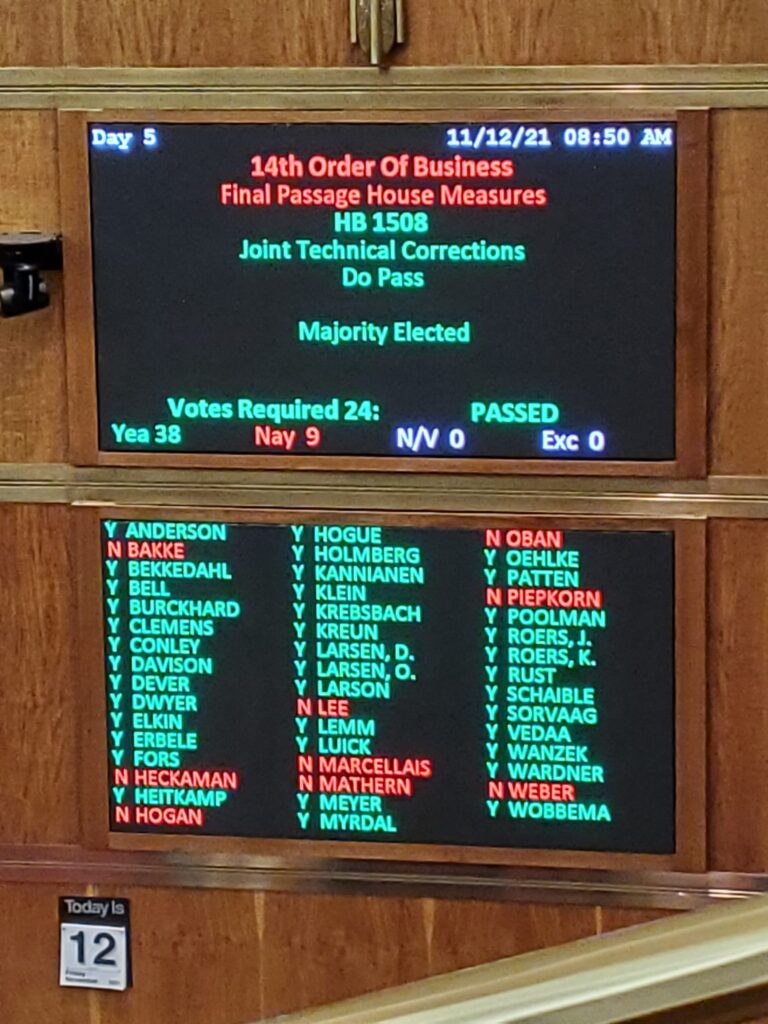

On Friday, Nov. 8, The North Dakota Senate passed a bill banning the teaching of Critical Race Theory (CRT) in North Dakota public schools. The passage of HB 1508, sponsored by Rep. Jim Kasper (R-Dis. 46, Fargo), occurred this morning, Friday, Nov. 8, after it had been sent over from the late-night session of the House on Thursday night.
The bill requires each school district and public school to “ensure instruction of its curriculum is factual, objective, and aligned to the kindergarten through grade twelve state content standards.” The bill's language continues, “A school district or public school may not include instruction relating to critical race theory in any portion of the district’s required curriculum ... or any other curriculum offered by the district or school.”
“A school district or public school may not include instruction relating to critical race theory in any portion of the district’s required curriculum ... or any other curriculum offered by the district or school.”
House Bill 1508
Three main sources of discussion in this morning’s senate debate were whether CRT is actually being taught in North Dakota K-12 schools, the issue of local control, and the confusion over what CRT really entails.
Sen. JoNell Bakke (D-Dis. 43, Grand Forks), who was also on the Joint Technical Corrections Committee (JTCC) that studied the bill earlier this week, spoke against the bill, saying, “We’re being told [CRT] is being taught in our K-12 schools. It’s not.”
“We’re being told [CRT] is being taught in our K-12 schools. It’s not.”
Sen. JoNell Bakke (D-Dis. 43, Grand Forks)
Sen. Erin Oban (D-Dis. 35, Bismarck) spoke against the motives behind introducing this bill. “The bill is not serious policy,” said Oban. “It’s a red herring. It’s the definition of culture wars.”
Speaking in favor of the bill, Sen. Dick Dever (R-Dis. 32, Bismarck) countered, “CRT may not exist in our schools, but it certainly exists in the political discourse in our country.” He went on, “We should not allow political indoctrination in our schools.”
Some senators preferred to allow the issue to be dealt with entirely locally, under each school board. Sen. Judy Lee (R-Dis. 13, West Fargo), who had been the co-chair of the JTCC, explained, “Local control is it. There is nothing more local than school boards.” She added, “This encroachment by the state into areas of local control concerns me.”
“Local control is it. There is nothing more local than school boards.”
Sen. Judy Lee (R-Dis. 13, West Fargo)
Some of the most informative debate entailed the nature of CRT itself. Sen. Janne Myrdal (R-Dis. 10, Edinburg), said, “It’s been said here, ‘CRT is a brand new thing. We don’t really know what it is.’ It’s not new.” Sen. Myrdal connected CRT directly to an institute in 1937 Frankfurt, Germany, called the Institute for Marxism. “It is very clearly a political ideology,” Myrdal emphasized.
Sen. Oley Larsen (R-Dis. 3, Minot) concurred with Myrdal. He spoke about his son attending classes in Minnesota. “It’s not just the class that he takes, but it filters through . . . what he’s taking there.” Larsen further explained his concerns regarding the ideological nature of CRT. “Understanding that racism exists is not the same thing as believing that CRT is the solution. People use examples of the existence of racism to claim that CRT is a necessary solution, but it’s not.” Larsen continued, “CRT redefines what it means to be racist, and then it becomes the vehicle for authorizing, encouraging, and instilling true racism.”
“Understanding that racism exists is not the same thing as believing that CRT is the solution.
Sen. Oley Larsen (R-Dis. 3, Minot)
Sen. Nicole Poolman (R-Dis. 7, Bismarck) summed up why she decided to vote for this bill even though she thought outrage and fear over the issue has been manufactured. “The mistrust of public schools [the outrage] has created is very real,” said Poolman. “And if we can do something to reassure parents that in public schools, we are not having a political agenda, then I think that we should do that, because the fear and outrage is very real, even if I believe that fear and outrage was manufactured.”

The bill passed the Senate on a 38-9 vote, after having already passed the House. It will go next to the governor’s desk to be signed into law.